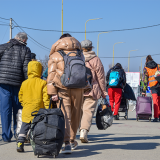
Labour market policies
To improve the functioning of labour markets, policymakers need to address labour market mismatches, labour market segmentation, and design employment policies geared towards the integration of specific groups into the labour market. Active labour market policies (ALMP) are public interventions which are explicitly targeted at groups of persons with difficulties in the labour market. These policies include Public Employment Services or other publicly funded services for jobseekers. Active support to employment is included in the European Pillar of Social Rights.





















